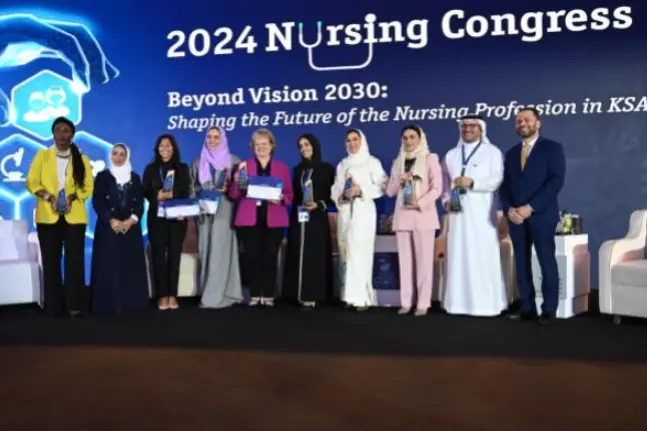PHOTO
Dhahran, Saudi Arabia: Johns Hopkins Aramco Healthcare (JHAH) successfully concluded its inaugural Nursing Congress in Al Khobar earlier this month. Under the theme 'Beyond Vision 2030: Shaping the Future of the Nursing Profession in KSA’, the congress convened over 350 healthcare leaders, policymakers, academia, and nursing professionals from key institutions across Saudi Arabia over two intensive days to envision a strategic roadmap aimed at elevating nursing practices beyond the ambitious goals set by Vision 2030.
Amidst the significant transformations driven by Vision 2030 and a growing population, now standing at over 37 million, Saudi Arabia's healthcare sector has seen a 23% increase in the number of nurses, growing to over 235,000. With an additional 175,000 healthcare workers needed by 2030, JHAH’s congress emerged as a key forum for facilitating critical discussions, uniting diverse perspectives, and promoting proactive dialogue to address these challenges.
JHAH continues to drive significant advancements within the Saudi healthcare landscape, setting the stage for a resilient, technologically advanced, and patient-centric healthcare system that aligns with the goals of Vision 2030.
Hani Ayyad, Chief Nursing Officer at JHAH, said, “Nurses are the backbone of our healthcare system, and this congress is a testament to their essential role in shaping the future of healthcare in Saudi Arabia. By advancing nursing practices, nurturing leadership, and implementing innovative care models, we are not just enhancing the profession; we are fundamentally transforming patient care across the Kingdom. By bringing together diverse perspectives to achieve meaningful change and elevate nursing standards for improved patient outcomes, the Johns Hopkins Aramco Healthcare 2024 Nursing Congress has sparked collaboration and innovation industrywide.”
The congress featured 24 diverse topics, presented by 29 local, national, and international speakers, and included six interactive panel discussions and debates. Distinguished speakers from the Saudi Ministry of Health, National Guard Health Affairs, King Faisal Specialist Hospital & Research Center, and the Johns Hopkins Health System in the United States, were among the key participants.
Sessions covered essential topics, including the scope of nursing practice in the Kingdom, national performance benchmarks, and the implications of Vision 2030 policies. Discussions also focused on the regulatory landscape governing nursing practices, exploring how nurses can contribute to shaping policies that empower the profession and ensure the highest standards of care. Additionally, the congress explored financial strategies for workforce planning, stressing the need for increased investments to strengthen the financial sustainability of healthcare organizations.
Dr. Mohammed Al Ghamdi, President of the Saudi Nurses Association and General Director of Nursing at the Saudi Ministry of Health, said, “The 2024 Nursing Congress shed light on the dynamic and transformative role of nursing in achieving Vision 2030's healthcare objectives. The economic impact of the nursing workforce on the healthcare system is significant, as their involvement drives efficiency, reduces costs, and improves the quality of care. Nurses are essential to decision-making and health policy formulation, and we are creating actionable plans that will equip nurses with the skills and competencies needed to tackle the complex challenges of our evolving healthcare landscape. This ensures that our healthcare system remains resilient, adaptable, and globally competitive.”
Leadership development in nursing was another key theme, with a focus on succession planning, empowering female leaders, fostering resilience, and promoting entrepreneurship in the sector. The integration of cutting-edge technologies like AI into nursing practices was also highlighted as a means to address the Kingdom's evolving healthcare needs and revolutionize patient care. Participants explored global nursing challenges and opportunities, such as improving workplace environments, enhancing staff health and well-being, and promoting diversity and inclusion within the profession.
The congress also underscored the importance of continuous learning and innovation in advancing nursing standards, demonstrated through 40 poster presentations that showcased research-driven advancements and quality improvement projects led by nurses across the Kingdom. Sessions reaffirmed the commitment to patient-centered care, in line with Saudi Arabia’s healthcare model, promoting compassionate care that respects the dignity and individuality of each patient.
Dr. Deborah J. Baker, Senior Vice President for Nursing for the Johns Hopkins Health System, added, “Innovation in nursing is critical to improving patient outcomes and advancing healthcare. This congress has highlighted the importance of global collaboration and continuous learning to build a nursing workforce that is not only prepared for the future but is also setting new standards of excellence. By focusing on workforce development, technology integration, and leadership growth, we are creating a framework that benefits both Saudi Arabia's healthcare landscape and the global nursing community, ensuring that patient care remains at the forefront of all we do.”
The outcomes of the Nursing Congress are set to introduce new models in nursing education and professional development, align workforce planning with Saudi national health priorities, and foster a resilient, adaptable, and future-ready nursing workforce.
Building on this momentum, JHAH continues to redefine healthcare excellence in the region, expanding its influence through cutting-edge research and advanced clinical practices. With a holistic approach at its core, the organization seamlessly integrates state-of-the-art medical technology with compassionate care, ensuring every patient benefits from the highest standards of treatment. This forward-thinking strategy enhances immediate healthcare outcomes and strengthens the long-term sustainability and resilience of the healthcare system.



















